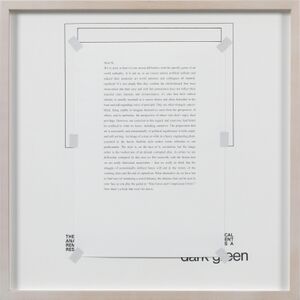Letters to the Red Crayola IV, 1976-2012
| Letters to the Red Crayola IV, 1976-2012 | |
|---|---|
 | |
| Art & Language | |
| Project | |
| Year | 2012 |
| Dimensions | 41.4 × 41.4 cm[1] |
| Materials | Ink, acrylic, collage and mixed media on paper |
Text
Dear M, We're sorry to hear of your recent difficulties with the specific genre of art world radicality. Is it just us, or are (most) artistic political radicals and indeed their academic art world admirers and colleagues all innately repellent? It's not simply that they confirm the old-fashioned (but true) observation that their easy and well fed contrariness does not reflect their material class interests and circumstances, it's also that their radical identity is usually assumed as a career choice and often defended in the loud and self-regarding voice of principle. They are often strangely aspect-blind, being unable to imagine themselves seen from the perspective of others, and in particular, the perspective of others who don't enjoy their privilege. However, our cynicism in this regard, and yours too, had better be confined to what we know, including ourselves. The proposition that art is necessarily and automatically of political significance is both empty and self-serving. An image of a man at work in a heavy engineering plant, executed in the heroic Stalinist style makes ironic reference to our predicament. The style is, on the face of it, ouvrièriste. but the image refers to the worker-ism of an already corrupted elite. As artists we are differently corrupted. In this case we flirt ironically with the fiction that we are really dialectical materialists — that we really do think that the struggle of economically defined forces will end in the victory of the working class and the end of capitalism. What alternative do have but to find ways of sustaining a weird distance, the distance that can be seen in your face as you play the guitar in 'Nine Gross and Conspicuous Errors'? Now there's a body that won't lie down.
Interpretations
- The background image references Dialectical Materialism (Dark Green) (1976)
- The text references one of Ten Posters: Illustrations for Art-Language (1977)
- The end of the text mentions Nine Gross and Conspicuous Errors (1976)